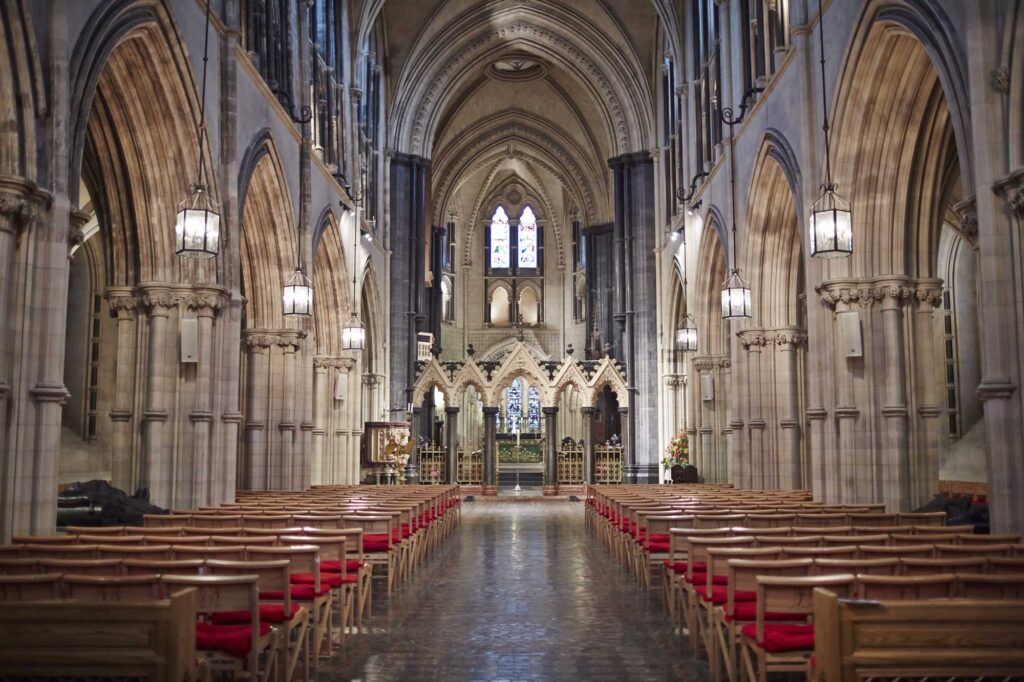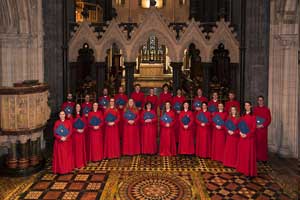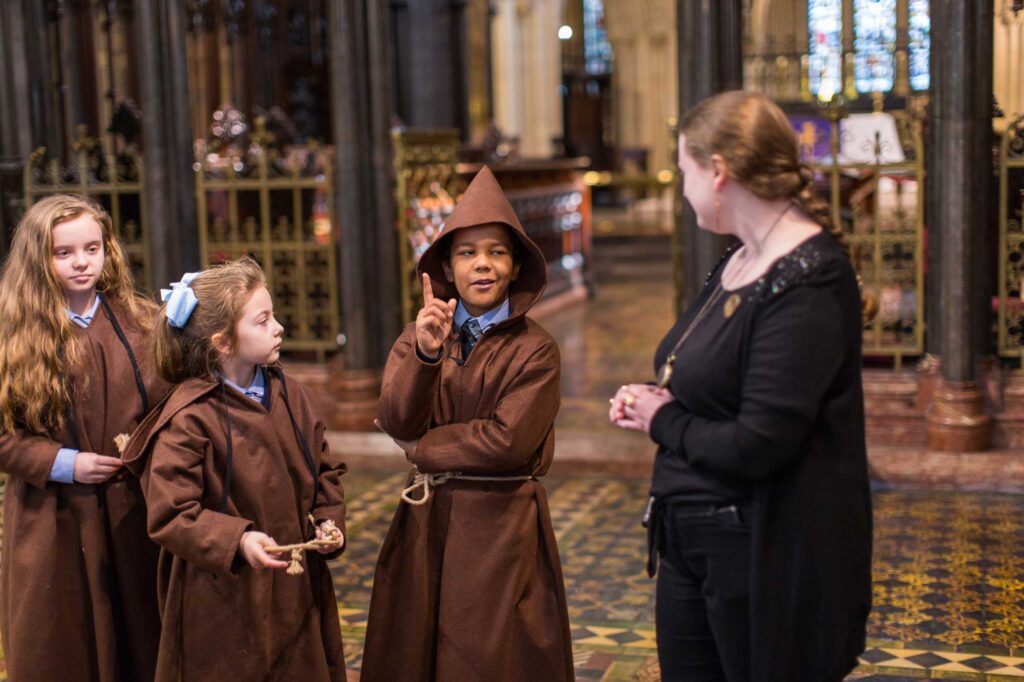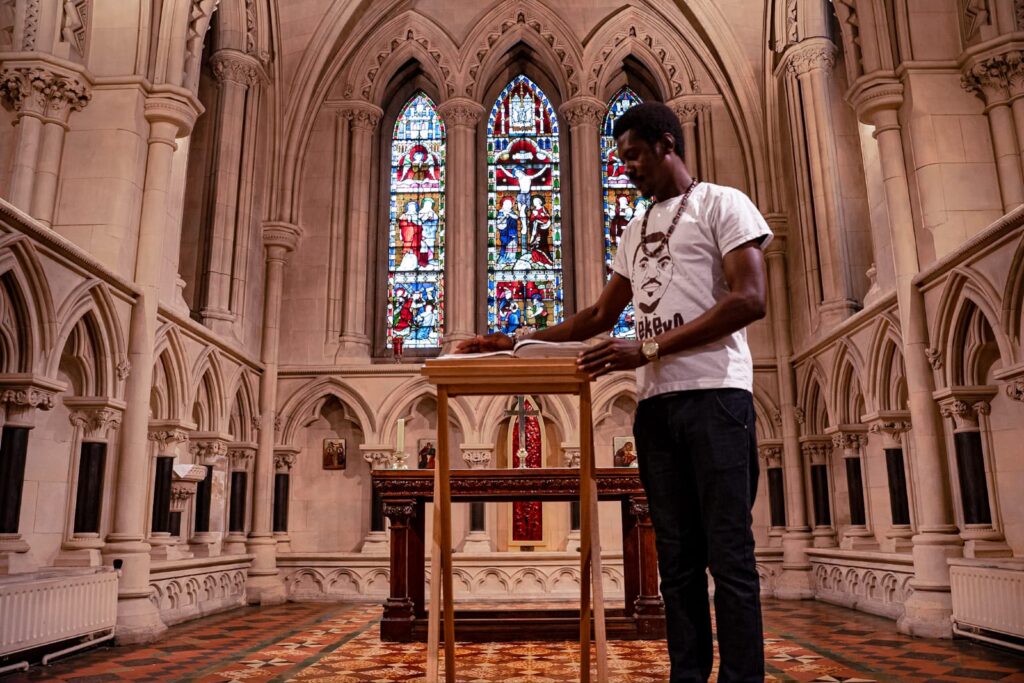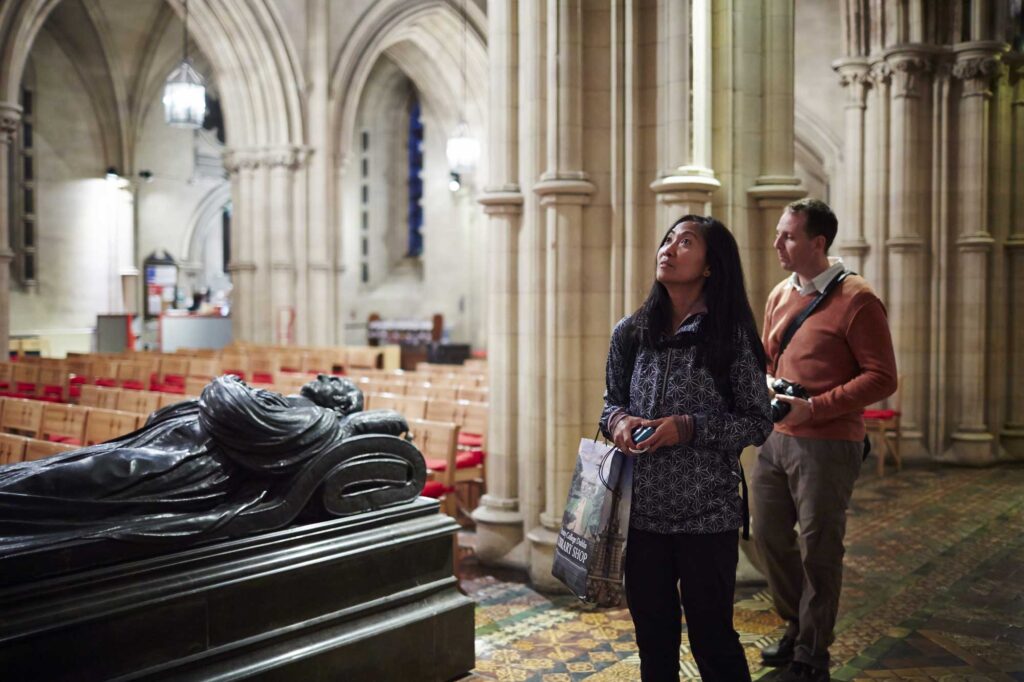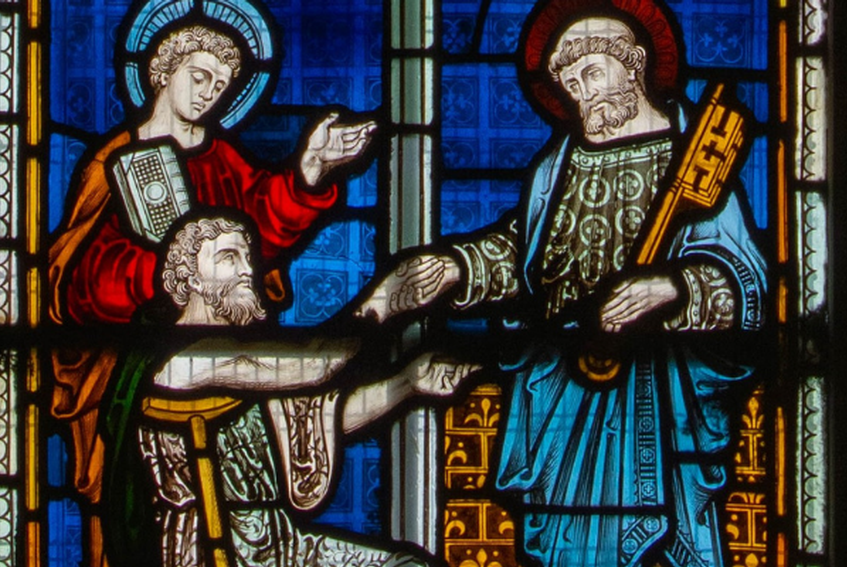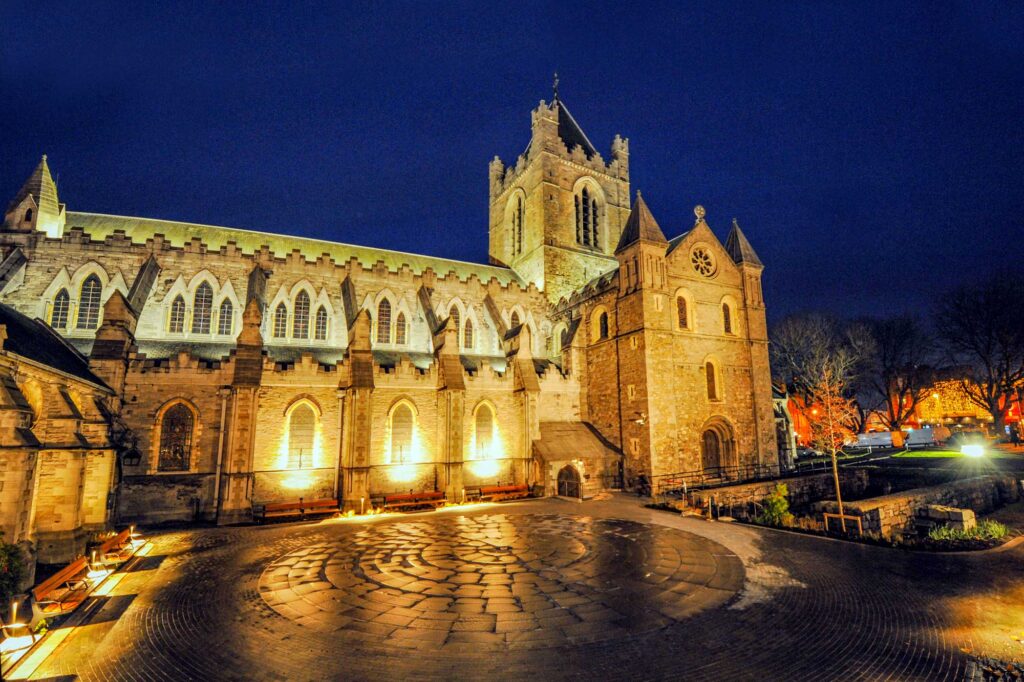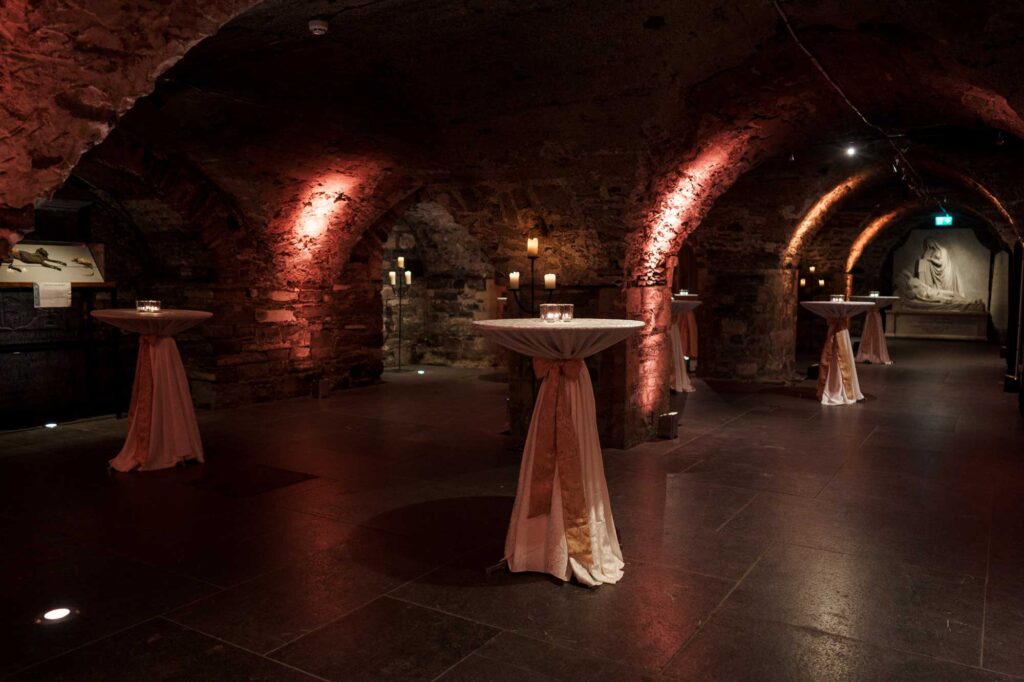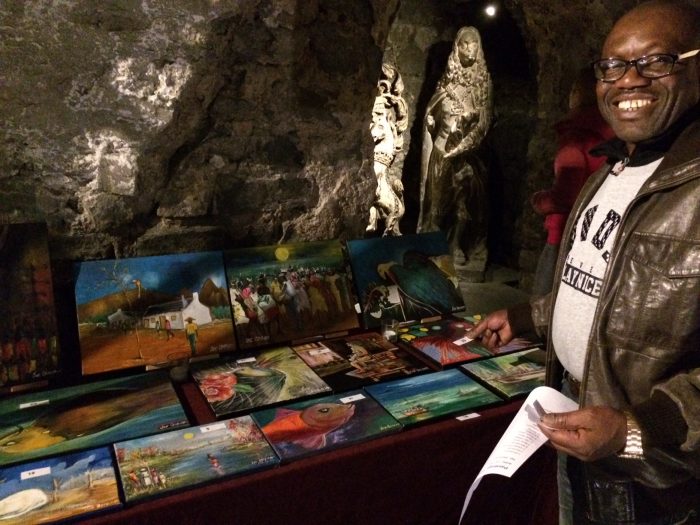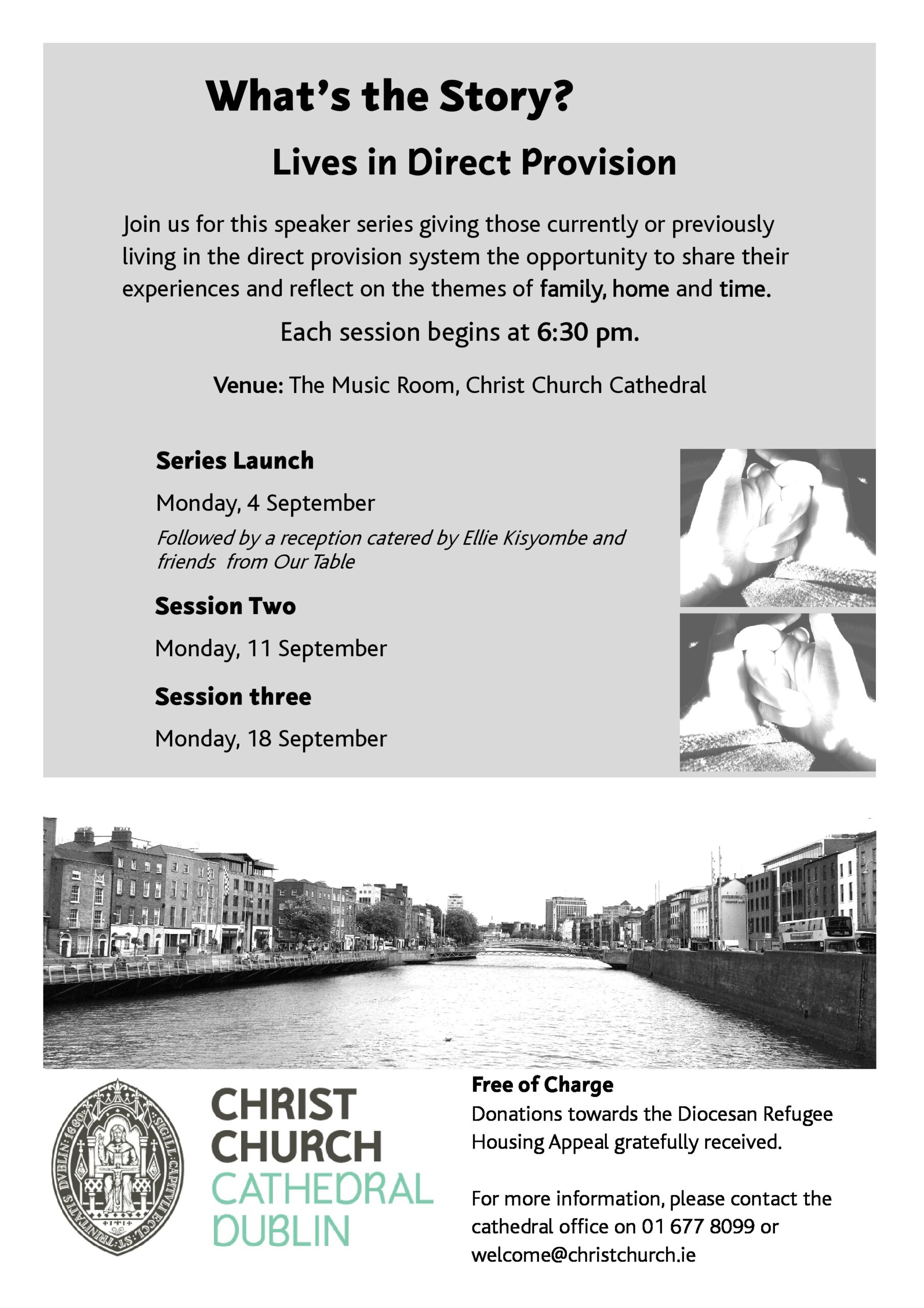“What’s the Story” Series
‘What’s the Story; Lives in Direct Provision’ Speaker Series
In September 2017, we launched a speaker series entitled ‘What’s the Story? Lives in Direct Provision’. This eye-opening series of lectures looked at what it means to live in the direct provision system, focusing on themes of home, time & family.
We held our last in-person What’s the Story? event in October 2019. Plans for 2020 were placed on hold due to coronavirus restrictions, and our 2021 event took place virtually during Refugee Week in June. The event included 5 personal, powerful video reflections.
Reflections from our third series, October 2019
Reflections shared by three of our attendees:
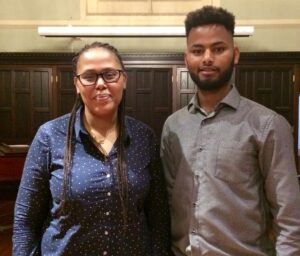
‘Narrative medicine’ isn’t a new idea, but it is finding traction in a range of influential new spheres. As a concept it can reshape the directive of Proverbs 31 – to give ‘voice to the voiceless’ – to mean that when a person is equipped to ‘voice their voiceless voice’, that something most transformative, empowering and healing occurs both to the individual and the listener, across a range of psychological, emotional, cognitive, cultural and political levels.
In this light, the series ’What’s the Story? Lives in Direct Provision’, is a remarkable example of ‘narrative medicine’. It draws its voices from those living under a system, which has been described by the Irish Human Rights and Equality Commissioner Emily Logan, as a ‘severe violation of human rights’. Members of this system are also largely intimated against and barred from voicing their voice publicly.
In sharp contrast therefore, the annual series offers participants the wide open space of an unfiltered open mic, it provides a concerned yet trusted audience and it takes place in a deeply symbolic and evocative setting.
Christ Church Cathedral represents so much of the heart of Dublin – with contemporary civic and religious headquarters, historic Viking foundations and even the heart of the city’s Saint, all pivoting in or around the place. Being at the historic heart of Dublin, therefore allows the Cathedral to bestow a unique sense of authority, recognition and affirmation upon all speakers. On Monday 21st October, all four speakers began by recognising this as they registered their sense of privilege at being invited.
As is expected with any voicing exercise, each contributors style, theme, tone and approach was distinct and yet each had profoundly shared heartfelt and emotional qualities.
At a time of widespread anti-Direct Provision meetings in towns and villages across Ireland, it was so powerful to simply encounter the real stories of residents, from their own perspectives. Surely this is a Mother Church leading by example? Surely this is a fulfilment of all Christian’s obligation to give ‘voice to the voiceless’?
Stories are what our lives are made up of. The stories that we heard from people now living in Ireland were heart breaking, full of joy, inspirational, and a real testament to the lives of many people from across the world. One went from tears of heart break, to tears of joy. All of us part of a human journey. I felt inspired and disturbed, after a wonderful evening of very trusting speakers, who bared their souls with such passion, dignity and integrity. Disturbed is a valuable emotion, to lay many questions out in our minds, and to nudge us slowly but surely to become more compassionate and mature in our connections with people who have to struggle so hard to find a peaceful place, to live out their lives in dignity. Our comfortable lives sometimes can dull our sense of social responsibility, a responsibility which the radical Gospel calls on us to uphold.
Sanctuary, by Joe Odiboh
There is no miracle in the street
Love is expensive and hatred is cheap
Since I have been on the road
It’s been to me hot and cold
Now I am back to seek solace in you
You’re telling me no sanctuary
I built confidence upon my pride
For the crime of treason there is a price
If you are guilty you are going to pay
All we need is love
All we need is sanctuary
Baby, sweet baby
Can’t you see I am on my knees
Asking for love
Begging for love
Like a Christmas tree.
Direct Provision my not –so –sweet home!
When I got an invite to come and share what’s the story with lives in direct provision, I was more than happy to participate.
When I was informed the themes which are family, home and time …I was suddenly hesitant because I realised then how removed I was from those concepts. Thankfully I came around to share under the theme ‘home’, my personal experience of living in direct provision for 2 and half years.
The theme of ‘home’ is about ‘how can a new sense of home be created while living in Direct Provision?’ My honest answer is I don’t know;
It was in the middle of a very cold winter night sometime in last year. Myself a certain young man in his early twenties from west Africa, who’s here with his mum and siblings were returning from the Monday evening meeting at Dun Laoghaire Refugee project. So, we left Dun Laoghaire just before 9pm, got to the city in time to for the 10pm Mathews bus to Bettystown – which dropped us at about 11:40pm by Mosney Junction. Now, we had the 20 mins walk before us to get to Mosney – by midnight. As we walked, we chatted very little, as we may have both been preserving whatever energy we had for walking. I was particular grateful that my friend was with me on this night as, I walked that strip many times on my own.
Now as the clock was approaching midnight, we too were approaching the big gates of Mosney and something phenomenal happened……
Ladies and gentlemen ………. I suddenly broke into a song ………………
‘Wow, you like this place, don’t you?’ said the young man to me.
‘Why do you say so?’ I retorted in a defensive tone.
‘Because you have been quiet all along and now you just broke into a song as we got here. It means you like this place.’ His tone and manner were rebuking.
‘Oh well, it’s freezing out here and I’m going home or at least a place I call home.’ I went on and on, not wanting to give this young man an opportunity to say anything anymore, because at that particular moment I felt ashamed and guilty.
How could I like such a place that is causing pain, sorrow, helplessness and despair to so many people?
I went home to ponder deeply about that incident. I couldn’t find an explanation of why I had broken into a song, apart from the young man’s finding. I understood his anger and frustration because his family had at that time been in the system for 4 years.
But I didn’t understand my own feelings around that.
While I was preparing for this sharing, I found myself on the Google search engine looking for what the noun ‘home’ actually means. What is a home really?
Mostly it is defined as a place where one lives. I had previously known a home to be a place where a family and love lives. So whether we accept it or not direct provision centre are ‘homes’ for us, while we wait for our applications to be processed.
Louis Hay said we should love our homes for them to love us. The challenge for asylum seekers is that, while others choose their homes, asylum seekers do not have a choice. While others go home to make beautiful meals, most asylum seekers live on canteen meals. While others wake up in their homes to go to work and come back in the evening, asylum seekers are not allowed to work. While others can invite friends and family to their homes, asylum seekers cannot. Nor can the children in direct provision centres invite their friends for sleepovers. While beautiful memories are created at homes, in direct provision centres horrible memories are created. Asylum seekers are governed by unnecessarily restrictive rules which makes us feel like we’re living in an ‘open prison’. Homes do not feel like open prisons. Therefore because our supposed ‘homes’, which are direct provision centres, do not love us –in fact they hate us– that makes it very hard for us to love the centres or to call them homes. We have no place to call home. To be honest we’re really homeless. Asylum seekers are homeless.
The direct provision system is a Magdalene laundry of our times, running in the form of a lucrative business, running at the cost of the lives of those seeking international protection in Ireland.
The saddest part about being a homeless asylum seeker is that nobody knows and nobody cares. That is why we’re so grateful for such platforms that afford us the opportunity to tell our stories. We also appreciate the people that spare us their ears. Hopefully if we keep telling the stories of our struggles and you keep telling other people – one day and maybe one day we shall see, feel and taste freedom.
Just like a candle doesn’t lose its light by lighting another candle, there is nothing to lose for any Irish person who choses to support or stand in solidarity with asylum seekers, support could be as simple as a phone call. Any outside contact makes a big difference when you’re an asylum seeker living in limbo and languishing in those inhumane centres.
If years from now someone asks you what did you do about the direct provision system, what would you say?
Keeping Busy
l came to Ireland in 2017 in February fleeing persecution from my country of birth. As an infant specialist teacher l was used to setting a timeline for everything I needed to do. As such the routine that l found in the direct provision centres really killed me psychologically, mentally and emotionally. Imagine having to sleep, eat, sleep, eat day in day out. l believe in the school of thought that stipulates the importance of the fact that every minute counts and every individual should make the next day better than the previous one. This yields growth in any society. However when I arrived here asylum seekers were not subjected to growth: no third level education, no right to work, no empowerment. Some people had been in the system for as much as nine years and still waiting for a decision on their cases. With a weekly allowance of €19.10 or €21.60 one would not be in a position to sponsor himself to do level 5 courses. You would have to apply for funding from organisations like Irish Refugee Council, St Vincent de Paul and others. However if you look at the ratio of the international protection applicants to the funders it is impossible for everyone to get that funding. A lot of time has gone down the drain with most people in the direct provision and this has resulted in a lot of mental health issues in this community.
I am one person who does not allow problems to pin me down. At the end of 2017 l thought of using my time wisely, and with the skills from I gained in art at college, I started a jewelry making project. It is however important to note that we process our challenges differently. Some people cannot raise their heads above their problems, such people end up enduring to depression. My main aim was to move away from concentrating on my problems and bring out the positive in me. I would feel much better after producing something beautiful. Along the way l upgraded to making clutch bags, tote bags, customised shirts, diaries and earrings. l remember l could not thread a bobbin and a friend of mine Dee patiently taught me how to operate the sewing machine and to design bags. My project was started on saving €21 weekly allowance and have since bought 2 sewing machines. I am glad l did not waste time sleeping but i gained skills that no one can take away from me.
Our Dean’s Vicar, the Revd Abigail Sines, gives us the background:
What’s the Story? Lives in Direct Provision
In recent years the ongoing civil conflict in Syria has brought images of refugees attempting, through desperate circumstances, to find safe haven in Europe. This crisis moment brought a steep learning curve of awareness as these images were available to us via television, newspapers and online. Perhaps the most current and visible group, these heartbreaking images prompted me to inquire more about the situation of refugees in Ireland, to find out how Ireland was receiving refugees and if there were ways to be involved in this. It was in the midst of all this, about a year ago that I began to learn about the Direct Provision System, and the situation for those who are already seeking asylum here. With just over 5,100 accommodation spaces available in facilities around the country, those awaiting a decision on their legal status are housed in hostel-type living quarters. This ‘temporary’ living situation can extend for years waiting for one’s case to be processed, during which time asylum seekers are prohibited from work and have no access to third-level education beyond a few exceptional schemes. During this extended and indefinite waiting period, people face the practical challenge of becoming de-skilled, as well as dealing with the mental health impacts of isolation and marginalisation on top of whatever past trauma was involved in their having to leave their home countries.
Seeking to engage around these issues, the cathedral invited individuals from City of Sanctuary Dublin to conduct two awareness-raising sessions and also to help us think of how the cathedral might take practical steps to welcome newcomers in our city, especially those who are seeking sanctuary. We had a good turn out for these and developed a core of willing volunteers who could be called upon to receive groups and provide a welcome. From this starting point, the cathedral was able to host several different small group visits from various direct provision centres in and around Dublin, to offer them a guided tour of the cathedral and a chance to chat over a cup of tea in the crypt. We wanted to explore other ways to be involved in the conversation and so took the decision—or rather step of faith!—to host a speaker series. We envisaged this as an opportunity for those in the system to share their experiences in their own words. Given that social isolation is a major factor of life in direct provision, we wanted to offer a space for meaningful conversations and connection with people in the wider community. It seemed natural to title this series “What’s the Story?”, the common greeting often overheard on Dublin streets. At a deeper level we hoped that the opportunity to have their personal stories heard would be an empowering and confidence-building experience for the speakers.
The reflections, which took place over the first three Mondays in September, focused around three themes: home, family and time. We wanted to make the ‘launch’ the series special, and we were delighted to welcome the amazing Ellie Kisyombe, herself an asylum seeker, and others from Our Table to cater for the event.
The ‘What’s the Story?’ series featured nine speakers from around the world: Bangladesh, Botswana, Iran, Cameroon, Malawi, Nigeria, South Africa, Somalia, Syria. Through prose and poetry they shared their struggles but also their strengths. It was a privilege to hear their stories. One of the poems contained this gripping line: ‘I promise I will not be a foreigner in my next life. I promise to be born Irish’. In these stories, we heard repeatedly the voice of people with something to give, people who want very much to be accepted and to make a contribution to the place they now call home.
Below are two reflections by those who attended and who were willing to share how they had been impacted by the stories they heard. The first reflection comes from Celia Dunne, the Dean’s wife:
Telling the Story
By Celia Dunne
This series of presentations by residents in direct provision was for me humbling, inspiring and at times deeply moving. The speakers, four women and two men, whom I heard on the first two evenings were heart-wrenchingly honest, courageous, eloquent and talented. They are people we need to embrace, encourage and appreciate that they chose to live in Ireland.
“What does ‘home’ mean for you?” This was the question posed to four women living in direct provision in Ireland. A private space, somewhere to relax, be yourself, a place to sleep comfortably, cook the food of your choice, watch television, enjoy access to the internet. For most of us present, as well as the general population, these are givens. But for these four women and all those living in direct provision in Ireland and elsewhere, their story is very different. They can take none of these ‘givens’ for granted. A Nigerian mother of four young children had lived for three years without a private space for her husband, herself and the children, and no kitchen of her own. Only in the last 6 months had the family been moved to accommodation where, at least, the family has a private unit where they can close the door. She told me that although she was very grateful for this move they were finding it very difficult to integrate into Irish life given the distance from the local town, lack of money and regular transport. I asked her was she still pleased to be in Ireland. “Oh yes, definitely. Here, I am not afraid of being shot at when I go outside.” I wonder if I am not alone in feeling that we can be smug in our comfortable surroundings. I think we can delude ourselves by believing that because these fellow humans have chosen to flee war-torn countries to live in the relative safety of Ireland, it is enough that they are here, albeit in unsatisfactory surroundings. “We all share the one bread.” We are all one. I am acutely aware of my own shortcomings in being more pro-active in welcoming “the stranger” into our midst. How is it for you?
A young woman from Somalia spoke eloquently and movingly of how aware she was of “time.” Of time passing so quickly and how she could so easily feel stuck. However, she was fortunate to recognise how easy it would be for her to sink into negativity and depression over her situation and how important it is for her to keep positive and be as pro-active as she can. She has had the strength of character to turn her thinking around, to view this time of unemployment as a blessing. She has time to read, to learn better English, to acquaint herself with her new culture through books. In this time of so-called ‘poverty’ she is finding great wealth.
A middle-aged businessman from Iran has taken a similar positive attitude to his “free” time by motivating others in his community to organise activities in different Irish locations, working in a voluntary capacity, offering skills helping with improvements. In this way the sense of “oneness” is encouraged with people of many nationalities coming together, creating a community of their own as well as helping to integrate into their chosen land.
Thank you to Abigail and the team for raising awareness of those in direct provision. May we be moved to continue the process.
The second reflection comes from Mary Oyediran. Ms. Oyediran had never been to the cathedral before, but attended at the invitation of a friend who had heard about the series:
Hearing the Voices of Asylum Seekers
By Mary Oyediran
My friend’s invitation provoked me: come and listen to voices of asylum seekers! I was intrigued. It was important to listen with my inner ear to their stories. I wanted to be involved and help. This was a way in to learn and gain practical wisdom about the people who were seeking asylum in Ireland.
The first Monday filled my heart with despair initially, a little disturbed about the situation of real life. Hope and opportunity followed as the strength and character of each voice were brought to light. They were resilient! My heart was cheered. Each speaker poured out their heart and gave a charge to their audience. Each voice was determined to survive despite the difficult regulations and restrictions in direct provision centres. They found hope in their new adopted country.
I was touched that first night by reference to the children and the impact on their childhood. That gripped me! Going to school from these centres created more challenges for parents and their children: obstacles of low self-esteem and difficulty forming long-lasting friendships with peers due to frequent movement from one place to another added to the strain. Some found that their children hated to disclose their address to other children. There was a stigma attached to receiving “free food.”
One of the voices was so poetic as she used vivid imagery to capture our attention, with descriptive colourful verses on the truth about living in a direct provision centre so far from home. She was ready to her take her place if given the chance! She wanted to fit in and play her part. Immediately after these speeches, we were escorted to the crypt. Instead of a cold, dark and dingy place as I expected we were greeted with the delicate aroma of ethnic savouries. A banquet table fit for a king was presented to us. I sampled as much as possible the mouth-watering dishes on offer. We were not disappointed. The cooks were themselves asylum seekers.
Networking was easy and straightforward. As we all agreed the food was so delicious it made it easy to make new friends and strengthened relationship with the old. It was an amazing end to a thought-provoking night.
The second week was interesting because we had only male voices. Both men had to face battles and shared thoughts that left me speechless. The dignity of a man to provide for his family was taken away. That was a denial of a human right! One of the speakers spoke on “time.” As a society time is taken for granted. I am guilty of this! But this young man had come to value time. He saw opportunities in every hour, every minute, every second. He was determined not to waste any of it regardless of his situation. He concluded in a nutshell, saying, “time is gold”, a precious commodity that must be valued. It was a major lesson to learn from that voice. We were humbled by his perspective! He never complained.
The final Monday we were privileged to listen to the voices of three beautiful women, all mothers seeking asylum: running, leaving behind a painful past and reaching for a new future. Not being able to cook for their children and juggling life the best they can, their situations are not easy. Each female voice called me to get up and make a difference.
We all have a part to play in assisting asylum seekers to make Ireland a sanctuary. We could do it as an organisation with resources, or individually as volunteers. We must take action and not be hearers or spectators but take a definite, decisive decision in our hearts to get involved and become part of the solution. I have established contact with some of the speakers since the series. We have joined together to meet a local TD to discuss practical issues asylum seekers face, such as opening bank accounts, getting identification cards, registering to vote and finding accommodation. This process is just the beginning for me. I am ready and willing to learn!

